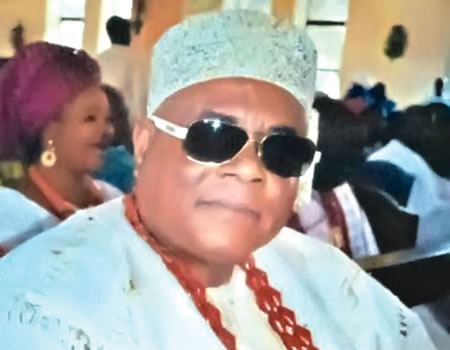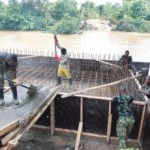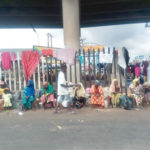Can you reflect on your race to the throne?
It was a race, a keen contest in the true sense of it. But I give glory to God that in the end the truth emerged.
How do you mean by ‘the truth emerged’. Are you the truth?
There is no doubting the fact that I am the truth in the matter. Those who knew the beginning of the race know what I mean.
You need to expatiate on this for the benefit of the reading public.
I should even ask you to go and do your findings on how the race began and how I came into it. I was not on the list of the 14 contestants presented to the ifa priest who was to screen the list. It was a surprise to everybody that none of the names presented was picked.
Then how did you come into the picture?
It was an uncle of mine who submitted my name.
Did he call you that he would submit your name?
No. I was in the dark of what was going on back home. I was even too busy to spare time for such. If you knew me back then in Italy, you would know what I mean. I ran a very tight schedule because I was into business which involved travel round Europe. I was popular among Nigerians living in Italy. So, I was not aware that my uncle would submit my name.
Then how was your name picked?
Don’t forget that I was not there to know how it happened precisely. But I was told that when the ifa priest asked the ifa about my choice, it was an instant affirmation. They said the ifa priest asked: ‘Why didn’t you submit this name in the first place?’ I was told that the baba warned them not to tamper with ifa’s choice. That was how and why I was called.
How did you receive the news?
The news was not delivered in details. I was only told that my predecessor had passed on, and the town wanted me to be around at home. The message was not more than that. I did not know how it happened but I found myself crying. My wife came and saw me in that mood she never saw before. She also burst into tears. Neither of us could console the other. It was in this mood we were when one of my friends came to our residence. He asked for the reason we were crying and I told him of my suspicion as a prince. He laughed and said the news was a good one. But I shouted at him to stop it. Do you know what I did afterwards? I disconnected the cable of my telephone so that nobody would be able to reach me, talk less of disturbing me with such news. But my wife once told me about how metaphysical power was used to bring people back home and those people turned into something else in the society. That statement invoked some fears but I told her to let us allow God’s will be done.
How then did you change your mind?
That is what I wanted to say. In summary, let me say that it was an act of God that I returned home, especially when they told me that the other contestant was spending money. At that point I became interested in the race. They said he had dropped N150,000, which was a huge amount then. I smiled and told them that I would triple that amount. I sent N450,000 and became more interested, considering the support being given to me by the people.
Can you describe the race as easy?
It was not easy at all but to God be the glory. My contestant did his best, using everything he had to have the upper hand. I can remember what looked like blackmail against me. They said I was not educated enough to be the next Onire. They said I never attended university. They said I did not have a degree. When I heard that story and the story was gaining ground, I asked the elders and the town elite to organise a public forum where both of us would address them. I remember that the gathering took place at Alakuko in Lagos. Ire Indigenes who were based in Lagos led by Asiwaju of Ire organised it. I went there in a jeep, confident of myself. Our people had gathered, ready to listen to us. My co-contestant was called to speak first. After him, they called me. I stood and addressed them in English language for about 30 minutes. I rounded it off with Yoruba language, having told them of the need to always promote our culture.
What I said in Yoruba was a prayer. I said ‘my people of Ire, may God select between us one who would not wait before you ask for what you need to develop the town before he does it for the town.’ I told them plainly and sincerely that the race to the throne is not and should not be a do-or-die affair, if both of us genuinely wanted to serve the town. The next thing I heard was ovation. I could not believe my eyes. I did not know how I was able to weave that statement together because I was not a public speak by nature. If a gathering has more than two to three people, I would not address it. But on that day, I did and got an ovation. I learnt my opponent left the place, accusing the organisers that it was a set up to favour me.
Was that the end?
It was not, but that event gave the elite of the town opportunity to assess both of us. But I must say that the blackmail later inspired me to enroll at the Ekiti State University where I eventually bagged a degree in Public Administration. I must also say that the media supported me during the race. I later realised that my familiarity with their correspondents’ chapel was the reason. In particular was Remi Koleoso who was always at the forefront.
Since you came to the throne, to what extent has the status restricted you from your former life as international entrepreneur?
There is nothing that can restrict me. I was born a free man with royal blood in my veins. And I live to enjoy every moment of my life. It may interest you to know that I was the first person to own a power bike in Ado-Ekiti. I had everything to myself. My business was doing well. I was exporting timber, which I cut into sizes, from Nigeria to Europe. My business was expanding. But if you say that the throne has restricted that, I will agree with you. Again, there are some places I can no longer go, unlike before when I would be everywhere without considering anything. I love the good life; there is no doubt about that. Even till date, I don’t joke with my recreation hours but as a traditional ruler who must be seen as a standard-bearer, I have applied brakes to certain things.
How do you think Yoruba culture should be rescued from foreign influence threatening it now?
It has to start from us, the traditional rulers. I am not always comfortable being at a culture gathering and watching speakers trying to outdo one another in English language. That is meaningless. I remember when the Director-General of the Ekiti State Council of Arts and Culture, Mr Wale Ojo-Lanre attended our meeting and addressed us in English language. We called him to order and he apologised. We told him that the passion he is showing to his work needs to be promoted by the use of our language. He pleaded and we forgave him. What he has shown so far is the way to wake up that council. Ekiti is a blessed state in terms of rich culture. And it is high time the culture was showcased to the outside world. I think Ojo-Lanre is showing that direction now. I met a French somewhere in Amsterdam at a forum and the man insisted that he would not speak any other language apart from his French. He said he can speak English but his French comes first. Yoruba culture is too rich to play a second fiddle to any other one.






